Anthony Flaccavento is the executive director of Appalachian Sustainable Development, a nonprofit dedicated to developing healthy, diverse, and ecologically sound economic opportunities in southwestern Virginia and northeastern Tennessee.

Monday, 4 Nov 2002
ABINGDON, Va.
Early Monday morning, at the onset of November. A cup of strong coffee and a to-do list start this day off, like many others. Oh, and of course there was the stretch routine to work the kinks out of this 45-year-old back. It is raining, as it has been for much of the past three weeks, bringing a belated end to the summer’s long drought. The rain is too late for most farms, but hopefully in time to recharge our depleted wells and dry soil. I welcome it, though not the timing: My fall garlic planting is now much delayed. But then the weather is rarely what you need — or think you need — on a farm.
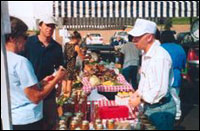
The Abingdon Farmers Market.
Photo: ASD.
We cultivate a little less than two of our seven acres on this “mini-farm” just outside of Abingdon, Va. We farm organically and intensively (in terms of space and time). As a sideline to two day jobs, farming is a bit much at times, but also quite rewarding, even rejuvenating. Laurie, my wife, is a fine arts teacher. I’m the director of Appalachian Sustainable Development. You probably read about us in Newsweek, or saw me on “Oprah.” Okay, maybe not.
Our farm’s produce is sold at the Abingdon Farmers Market and through the Appalachian Harvest organic growers network. The farmers market has grown substantially over the past two years, with a lot of work from a core group of farmers and a little help from ASD. This past year, we really seemed to turn the corner, with a much better customer base and 15-20 farmers most Saturdays. A half-dozen of these folks are either running certified organic farms or raising grass-finished, hormone- and antibiotic-free meats and eggs. Not bad for a town of 7,000.
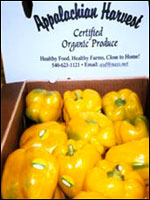
Appalachian Harvest peppers.
Photo: ASD.
Appalachian Harvest was started by ASD three years ago in an effort to increase the market for locally raised organic foods, and to help the region’s tobacco farmers transition to organic farming. “Transition” is a poor description of the process. Moving from tobacco to organic fruits and vegetables is more like a leap. Across a precipice. In the dark. With a hell of a headwind smacking you around. But it is working, pretty well at least. We now have more than two dozen growers in our network, and 90 percent of our production comes from current or former tobacco farms. We sold almost $170,000 worth of food to three supermarket chains, within and beyond our region. Tomatoes, peppers, cukes, squash, potatoes, eggplant, garlic, leaf lettuce, heirloom vegetables, and a few others. Our sales this year were 20 percent more than last year, but well short of our goal of $250,000. Many reasons for that. Stay tuned.
Today, I hope to talk to Mike Tipton, the head of merchandising at one of these chains. Our first attempt at a “value-added” product — an organic basil and garlic tomato sauce — is languishing on their shelves. We have some ideas for promotion and a better, more conspicuous display. Hopefully, we’ll get those wheels turning today.
This morning, I’m meeting with Tom Hanlon to talk about grant-writing. Tom is the director of Rivers Way, an outdoor camp, not far from Bristol, Tenn. Two of our three kids have been there when they were younger, and loved it. Tom is trying to get funding for a literacy program that incorporates outdoor activities and skill-building into a larger reading and confidence-building program. This is outside of ASD’s usual realm, though certainly compatible with our values. Tom is coming to us because we have a reputation as successful grant writers. (Are we truly successful? Sometimes yes, sometimes no. But the subject’s always on my mind.)
Later this afternoon, I also have a meeting with a local building contractor interested in buying some of our sustainably sourced wood for the homes they build. More about that tomorrow.
Tuesday, 5 Nov 2002
ABINGDON, Va.
This Election Day, there are two referendums on the Virginia ballot that would create public bonds if enacted. The first would provide bond funding for new construction at the state’s universities, the second for state parks. They should pass, unless people are persuaded that this is some sort of “new tax.”
In Tennessee, the political spectrum has moved so far to the right that every candidate, whether Democrat or Republican, state or federal, vies for the dual honor of most anti-tax and most patriotic. The prevailing wisdom among Tennessee politicians, and to only a slightly lesser degree, Virginia’s, is this: Of course we all want first-rate education in public schools, community colleges and universities; seniors and poor people are entitled to decent health care; and we need jobs and facilities and vibrant downtowns to attract newcomers and keep our young people here; BUT, to do this doesn’t require taxes, only more government efficiency. Less fat. More “free” markets. After all, who knows better how to spend your money — you, or some bureaucrat in Nashville/Richmond/Washington?
Of course that last question is intended as a rhetorical one. But I wonder. I’ve known a number of these state and federal “bureaucrats” in agencies ranging from economic development to housing, from forestry to conservation and environment. And most of them, like most of us, have seen declining budgets, decreased job security, and increased pressure to perform, to achieve tangible outcomes. Certainly there’s variability, but overall I’d give them and the programs they administer something like a B-. Plenty of room for improvement, but pretty solid.
Would I rather that we invest in family farms, local businesses, arts and cultural institutions, and community-based organizations? Of course, in fact that’s something we actively work towards at ASD. But is that what most of us do when the government “stops picking our pockets and gives us back our hard-earned dollars”? No. If we’re affluent, we invest in fast-growth companies with hopes of an inordinately high return, with little effort on our part. (That’s why it’s called “unearned income.”) If we’re working or middle class, we invest in Wal-Mart and McDonalds. A Big Mac is one share, a cheap shirt made in China is two. We invest — all of us — in the demise of our own communities.
So, what’s the alternative? More central authority and control? More personal freedom? How about this: More local engagement and greater personal responsibility for our actions in the marketplace.
Last night, I spoke with Ed Davis, a professor at nearby Emory & Henry College. Along with several other faculty members, and some administrative staff, Ed is trying to steer (to nudge) the college toward the policy and practice of “sustainable procurement” — in this case local, organic foods in the school’s cafeterias, and local, environmentally sourced lumber for renovation and new construction. Through our organic farmers network and some low-cost, low-tech hoop-house production techniques, ASD could enable the college to meet a significant proportion of its food needs from local sources. As the number of organic, grass-finished meat producers increases in our area, even more of the students’ and faculty’s dollars could be directed locally. And, with the expansion of our solar dry kiln, and the initiation of the Nature Conservancy’s Conservation Forestry Program, ecologically managed, private forestlands could provide the wood for trim, flooring, tables and desks on the Emory & Henry campus.
Efforts like this are already underway in some communities. Check out, for example, the work of Vermont Family Forests and its partnership with Middlebury College.
Tomorrow, we’ll begin to explore the details of ASD’s efforts to regionalize our economy and promote sustainable livelihoods. In the meantime, let’s stop buying shares in the global juggernauts.
Sunday, 6 Oct 2002
ABINGDON, Va.
I was out the door at 5:00 a.m. to meet the folks from “Good Morning America” in Duffield. They called yesterday and arrived this morning to film a segment on tobacco farmers growing alternative crops. Two of our growers will be featured. Wow! The show will air next Monday, Nov. 11, around 7:00 a.m. In the span of a week, I find myself and ASD featured in two places where I never thought we’d appear: an online magazine and the network news. Maybe “Oprah” really is next.
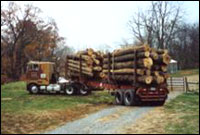
Log on: a load of Sustainable Harvest lumber.
ASD.
Meanwhile, back on Earth, the meeting with Tracy Swann, a local building contractor, went well. Jeff Coffey, manager of the Sustainable Woods processing center, brought samples of flooring, wainscoting, molding, and rough sawn boards. Tracy and her husband, Marty, build high-quality homes, ranging from the modest to the grand. She is considering utilizing our Sustainable Woods regularly, particularly since we’ll soon be able to provide her with a wide diversity of wood species and a range of grades, from “clear” boards (knot and blemish free) to “character woods” (wood with unusual grain patterns, occasional small knots, and other distinct features). Tracy’s main concerns are product quality, convenience, availability, and price, but she’s willing to pay a bit more for our products — 5 to 7 percent — if we prove reliable on the other points.
We started off yesterday by selling wood products to a contractor and ended it with a meeting to further develop a “good logger list” for our region. This project was initiated by Steve Brooks of Virginia Forest Watch, with ASD and the Nature Conservancy as partners. It follows an earlier, unsuccessful attempt to develop a “bad logger list.” The good logger list (better suited to our “win-win” culture) is intended to be a resource for individuals who want to have logging done, but want to be sure they contract with an exceptionally skilled and responsible logger. ASD will be able to use this list to recommend responsible operators to the landowners we work with.
These two meetings exemplify ASD’s “field to table” strategy for sustainable forestry. Our approach begins with the forest and the small, mostly moderate-income landowners who own over 70 percent of the woods in our region. Three years ago, ASD developed an ecologically rigorous set of “Standards for Sustainable Forest Management.” The Nature Conservancy, local environmental groups, and professional foresters worked with us for over a year to create these standards. Emily, our forester, uses these standards to develop long-term sustainable management plans and to guide timber harvests when they occur. The essential function of our management approach is to help restore degraded forests, while providing a long-term stream of revenue from periodic harvests. Right now, we work with landowners with 10 to 200 acres of forestland, though most have 50 acres or less.
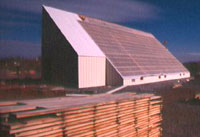
On board: the solar-powered dry kiln.
ASD.
Once Emily completes a management plan and it is approved by the landowner, careful harvesting of logs can begin. Recently, we completed a timber harvest on a 15-acre parcel near Abingdon that yielded approximately 40,000 board feet of logs, which were trucked to ASD’s Sustainable Woods processing center, located 30 miles west of Abingdon. The logs are being sawed into boards at the center by a private entrepreneur, Charles Fugate. Once the boards have air dried for two to three months, they go into our dry kiln, where the drying process is completed over a three- to four-week period. The dry kiln is solar-powered, with additional heat supplied by a wood-fired boiler unit (the slab wood from the sawmill supplies the needed wood for the boiler).
The next step in this process takes place when our boards are manufactured into hardwood flooring, trim, cabinets, and other home-building materials. A small group of local manufacturers works with us to produce the finished goods. The final step takes place when the consumer — a homebuyer, a church expanding its facility, a public library adding a wing — chooses Sustainable Woods. This has begun to happen in southwestern Virginia and eastern Tennessee, with contractors like Tracy playing a critical part in the process.
More tomorrow. Let’s hope we don’t get a big head after our network debut.
Thursday, 7 Nov 2002
ABINGDON, Va.
An excellent day yesterday with the four folks from “Good Morning America.” They were very open, down-to-earth, and enjoyable.
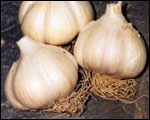
Organic garlic.
ASD.
We started the “tour” at 6:30 a.m. at Martin Miles’ farm in Lee County, in the far western corner of Virginia. Goats, greenhouses, and garlic were all that was left to see, given the time of year. Martin, a gruff old coot himself, is tender towards his 200-plus nannies, all Boer meat goats destined for supper tables (primarily Muslim and Hispanic). The goats provide an excellent manure fertilizer for Martin’s 16 acres of organic crops. And, they’re light on the land; in fact, the goats have replaced herbicide in his pasture fields as they completely clean them of briars, multi flora rose and other weeds cattle won’t touch.
At 8:30 a.m., we went to ASD’s “packing and grading house” just up the road from Martin’s farm. Our friends from ABC watched as we ran a few bushels of organic potatoes across our cleaning and grading line. That’s about all we have left now; we’ll close the facility in another week or so. Although we had some significant shortages in both supply and demand this year, we still ran nearly 12,000 cases of organic produce through this facility from June through October. Next year, we should approach 20,000 boxes, I believe.
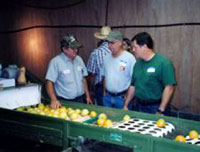
Martin Miles at the ASD packing house.
ASD.
The last stop of the day was at the LaForce Farm on the Clinch River. Tom, our agriculture education coordinator, guided the crew to the farm, which sits just outside the tiny town of Dungannon. When I first came to southwestern Virginia in 1985, Dungannon was a “hot spot” for grassroots development. I worked with a worker-owned sewing cooperative and a dynamic community organization, the Dungannon Development Commission. Seventeen years later, the co-op is long gone, but the DDC continues its work, including a partnership with the Nature Conservancy around eco-tourism.
Warren LaForce is one of the youngest farmers in our network, and one of the most articulate as well. He and his dad, Mansell, continue to raise tobacco, along with four acres of certified organic produce. In addition to the produce he raised this year, Warren also coordinated three organic production research trials, one on his farm, the other two on farms in neighboring counties. A partnership with Virginia Tech faculty and grant funds from the Virginia Tobacco Commission helped to make this possible. Virginia’s Tobacco Commission has become a terrific partner in our efforts to help farmers move to organic production.
Tom, Warren, and I talked briefly, a prelude to a meeting next week at which we’ll plan our strategy for grower outreach and recruitment for the 2003 season. With the new federal organic standards now in place, the certification process will be three to four times more expensive for Virginia growers and about twice as expensive for Tennessee farmers, relative to what they’re used to paying. Thus, we’ll need to start the recruitment effort sooner and try to find some ways to help reduce or defer those costs.
Tomorrow, some summary thoughts as we wrap up this week from the Appalachian Mountains.
Friday, 8 Nov 2002
ABINGDON, Va.
My last day with you, the viewing (reading?, surfing?) audience. I’ve appreciated the opportunity, truly, and hope I’ve provided interesting reading. Before I get to the details of this last day, and my profound and poignant parting thoughts, let’s get some contact information out, for everyone who might want to follow-up:
Appalachian Sustainable Development
P.O. Box 791
Abington, VA 24212
Phone: 276.623.1121
asd@eva.org
We’re always interested in hearing from other groups working on similar issues or trying different approaches to the same types of challenges. We occasionally do consultations, and frequently lead workshops and seminars. We also autograph baseballs, but that’s $20 a pop, plus shipping …
The rain has finally subsided, though the ground is still too wet for garlic planting. We sent our friends from “Good Morning America” home with some beautiful garlic (this year’s crop) and jars of our Appalachian Harvest organic tomato sauce. I was hoping to “plug it” on national TV, but no such luck. We will be testing Internet sales of the sauce starting later this month.
This morning, I loaded some logs in our Taylor stove, a water-jacketed wood stove that heats our house and a small greenhouse. This year’s wood pile is hickory, a bit of red oak and black locust, each a wonderful wood in its own respect. Locust is probably the best burning wood overall — slow burning, with a lot of BTUs, not quite as hard to split as hickory. Locust is also a legume tree, meaning that its nitrogen-fixing ability enables it to grow in and help restore depleted soils.
Heating with wood is not without environmental problems, although it’s not as bad as burning coal or oil. We do it at home for two reasons: I enjoy it, and it keeps us in touch, very intimately, with just where our heat comes from. All three of our kids participate in some way, more each year, as they get older. I believe that the act of turning your thermostat up is quite different, once you realize that you’ve got to find, cut, split and stack the wood, and you have to walk outside to load the stove at 6:00 a.m. Time will tell if this affects our children’s energy-consumption habits.
At ASD, it’s much the same challenge, albeit on a larger scale. Millions of people agree that family farms should be preserved, that corporate concentration in agriculture is dangerous, and that reducing or eliminating toxic chemicals from farming is an urgent need. But what do they, what do we do about it? The same is true in forestry, where there is widespread concern about clear-cutting, soil erosion from logging, and similar problems. Yet, few people know where to take that complaint.
We have not yet proved it, but my proposition is this: To fundamentally change our relationship to the ecosystem and to other people, we need to move from habits of extraction and consumption, to habits of creation, that is, habits that build community and sustain the ecosystem. Wendell Berry has called this a shift from “bad work” to “good work”. As he says in his essay, “Conservation is Good Work”:
We are connected by work even to the places where we don’t work, for all places are connected; it is clear by now that we cannot exempt one place from our ruin of another. The name of our proper connection to the earth is “good work,” for good work involves much giving of honor. It honors the source of its materials; it honors the place where it is done; it honors the art by which it is done; it honors the thing that it makes and the user of the made thing. Good work is always modestly scaled, for it cannot ignore either the nature of the individual place or the differences between places, and it always involves a sort of religious humility, for not everything is known. Good work can be defined only in particularity, for it must be defined a little differently for everyone of the places and everyone of the workers on Earth.
Here at ASD, we’ve embarked on a modest attempt to do “good work” in the context of our farms and forests, our food and buildings. To do this good work, we need not only the farmers, the loggers, and the landowners, but also the consuming public ready to choose willing to pay for this honorable work.
It’s been fun! Hope to hear from some of you.

